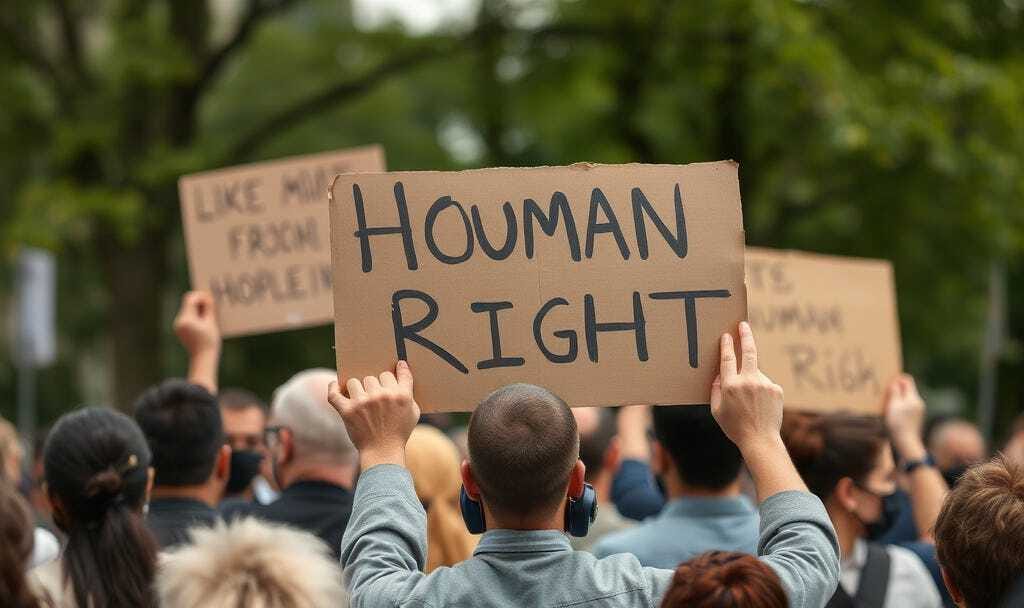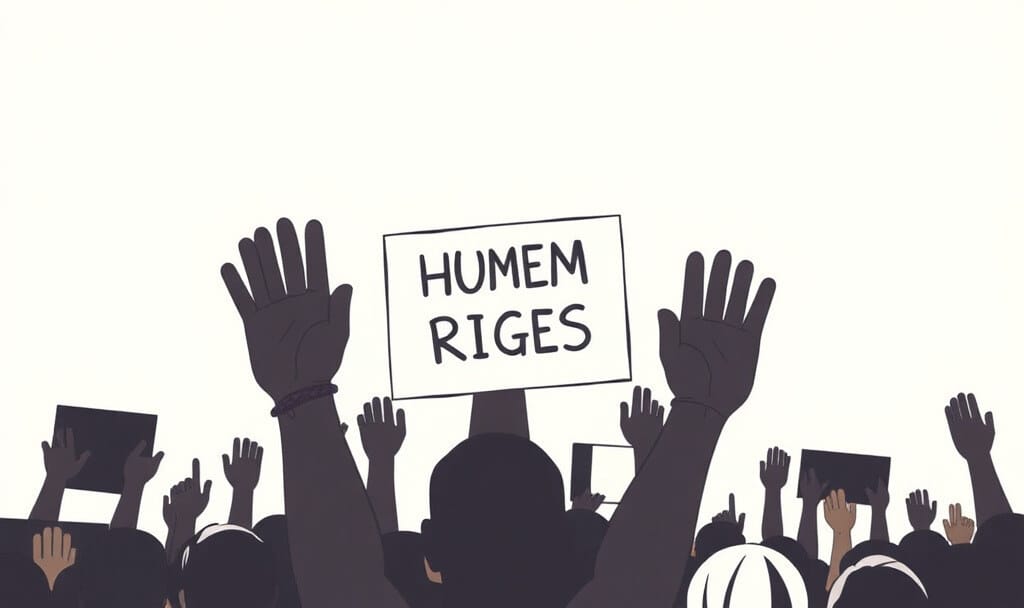The United States, often heralded as a global champion of democratic ideals and civil liberties, presents a deeply paradoxical subject when examined through the lens of international human rights law. While possessing a historically robust framework of constitutional protections, the nation simultaneously struggles with profound, systemic violations—particularly concerning racial equity, economic justice, and its adherence to specific international human rights covenants.
This paper provides a detailed academic analysis of the human rights landscape within the United States. It explores the foundational legal promise, critically assesses structural and historical failures, examines key contemporary challenges, and evaluates the nation’s relationship with international human rights mechanisms.

The United States stands as a global anomaly in human rights discourse. Domestically, the Bill of Rights establishes strong guarantees for civil and political freedoms, yet chronic failures in equitable application persist. This analysis argues that the primary human rights challenge within the U.S. is the critical gap between its expansive constitutional promises (de jure rights) and the unequal lived realities (de facto application), particularly for marginalized communities. By analyzing core shortcomings in racial justice, economic rights, and immigration policy, and evaluating the U.S.’s selective non-ratification of key U.N. treaties, this paper concludes that structural inconsistencies fundamentally undermine the nation’s claim to be a global human rights leader.
I. Introduction
A. Context and Scope
The concept of human rights in the United States is rooted primarily in the Constitution, specifically the Amendments ratified after 1791 and the post-Civil War Amendments (13th, 14th, 15th). These domestic protections focus heavily on civil and political rights (CPRs), guaranteeing freedom of speech, assembly, due process, and protection against unwarranted state intrusion.
However, the U.S. domestic framework operates in tension with the comprehensive global framework established by the United Nations, which emphasizes the indivisibility of rights, including economic, social, and cultural rights (ESCRs). This paper interrogates the performance of the U.S. framework by examining four critical areas: the selective constitutional emphasis, the legacy of racial injustice, the crisis of mass incarceration, and the reluctance to adhere to binding international norms.
B. Thesis Statement
The United States presents a unique human rights paradox: while its foundational legal documents provide some of the world’s strongest guarantees for civil liberties, the systemic failure to ensure equitable application of these rights across racial and socioeconomic lines—coupled with a deliberate rejection of key international ESCR treaties—creates a profound discrepancy between its professed values and its domestic performance, demanding fundamental structural reform.
II. Constitutional Foundations and Theoretical Gaps
A. The Primacy of Civil and Political Rights (CPRs)
The U.S. Bill of Rights enshrines classical liberal rights protections. The First Amendment protects fundamental freedoms of thought and expression, while the Fourth, Fifth, Sixth, and Eighth Amendments define procedural due process, protection against cruel and unusual punishment, and the rights of the accused. The Fourteenth Amendment, with its guarantee of equal protection and due process, serves as the primary constitutional vehicle for addressing discrimination and state abuses [Ackerman, 2014].
This constitutional architecture fosters a rights regime strongly prioritizing individual negative liberties (freedom from state interference) over positive entitlements (rights to social goods).
B. The Marginalization of Economic, Social, and Cultural Rights (ESCRs)
In direct contrast to most industrialized democracies and the international human rights consensus (enshrined in the ICESCR), the U.S. Constitution contains no explicit, judicially enforceable rights to healthcare, housing, employment, or an adequate standard of living.

This legal gap has translated into significant domestic human rights deficiencies. While the U.S. has ratified the International Covenant on Civil and Political Rights (ICCPR), its enduring refusal to ratify the International Covenant on Economic, Social and Cultural Rights (ICESCR) limits the domestic enforcement and even recognition of rights deemed indispensable by the global community. The argument often used is that such rights are matters of policy, not justiciable law [Sunstein, 2004].
III. Historical Failures and Systemic Inequality
The most profound human rights violations in U.S. history are inextricably linked to race and structural discrimination, demonstrating the failure of the Fourteenth Amendment to fulfill its promise of equality.
A. The Enduring Legacy of Racial Inequality
The centuries of slavery, Jim Crow segregation, and state-sanctioned violence represent fundamental breaches of jus cogens norms. While formal segregation was dismantled, subtle, systemic discrimination persists through practices like redlining, educational segregation, and unequal access to capital, creating intergenerational economic disparity that constitutes a human rights issue under the umbrella of discrimination [Coates, 2014].
B. The Crisis of Mass Incarceration
The U.S. maintains the highest incarceration rate globally. This phenomenon is a critical human rights concern due to its highly disproportionate racial impact. African Americans and Hispanic individuals are incarcerated at rates significantly higher than white populations, a disparity rooted in discriminatory policing, sentencing laws (particularly concerning drug offenses), and underfunded public defense systems.
Furthermore, the structure of the Thirteenth Amendment, which prohibits slavery except as punishment for a crime, provides a constitutional loophole that permits forced labor within correctional facilities, drawing intense criticism from international bodies regarding exploitative labor conditions and deprivation of basic dignity [ACLU/Human Rights Watch Reports].
C. Voter Suppression and Political Rights
Despite constitutional guarantees of political participation (15th and 19th Amendments), contemporary efforts to restrict voting access—including strict voter ID laws, gerrymandering, and purges of registration rolls—disproportionately impact minority and low-income citizens. The weakening of the Voting Rights Act of 1965 by the Supreme Court decision in Shelby County v. Holder (2013) has been widely criticized by human rights advocates as enabling state-level erosion of political rights [Parker, 2020].
IV. Critical Contemporary Challenges
A. Immigration and Border Policy
U.S. immigration policy has become a major flashpoint for human rights concern. Practices such as indefinite detention, lack of guaranteed legal representation for asylum seekers, and the controversial policy of family separation—which the U.N. High Commissioner for Human Rights condemned as potentially amounting to cruel, inhuman, or degrading treatment—represent clear breaches of due process and the Convention against Torture (CAT), which the U.S. has ratified [UN Report on U.S. Border Practices, 2019].
B. Militarization of Police and Accountability
The widespread use of excessive force by law enforcement, particularly against marginalized racial groups, remains a persistent human rights violation. The lack of robust, independent mechanisms for police accountability, the legal doctrine of qualified immunity, and the militarization of policing strategies have contributed to a climate where state violence often goes unpunished, violating the state’s positive obligation to protect the right to life and physical integrity [Amnesty International Reports].
C. ESCR Deficiencies: Health and Housing
The lack of guaranteed ESCRs translates into profound domestic crises:
Healthcare: The absence of universal healthcare coverage results in millions lacking access to essential care, directly impacting the realization of the universally recognized right to health.
Housing and Homelessness: The escalating crises of homelessness and housing insecurity, particularly in major urban centers, reflect a systemic failure to protect the right to an adequate standard of living, violating the spirit, if not the direct letter, of international norms.
V. International Scrutiny and Obligations
The U.S. relationship with international human rights law is characterized by a pragmatic, often isolationist, approach that prioritizes national sovereignty and domestic constitutional interpretation over full integration of international treaty obligations.
A. Selective Ratification and Reservations
While the U.S. has ratified core treaties such as the ICCPR, the Convention against Torture (CAT), and the Convention on the Elimination of Racial Discrimination (CERD), it has attached extensive Reservations, Understandings, and Declarations (RUDs). These RUDs effectively declare that treaty provisions will not be self-executing domestically and are subordinate to existing U.S. Constitutional law.

Crucially, the U.S. has failed to ratify several major instruments:
The Convention on the Elimination of All Forms of Discrimination Against Women (CEDAW).
The Convention on the Rights of the Child (CRC) (the only U.N. member state yet to do so).
The ICESCR.
This selective engagement fundamentally weakens the U.S.’s credibility when promoting human rights abroad and limits the legal avenues available to victims of rights abuses domestically.
B. Universal Periodic Review (UPR) Findings
Under the U.N. Human Rights Council’s Universal Periodic Review (UPR) mechanism, the U.S. consistently receives recommendations centered on its failures. The recurring themes of international criticism include:
The continued use of the death penalty (especially against juvenile and mentally impaired offenders).
Systemic racial discrimination and police violence.
Lack of accountability for past issues (e.g., drone warfare, Guantánamo Bay).
Failure to ensure ESCRs like guaranteed healthcare and paid family leave [UPR Reports on the United States, 2020].
C. Extraterritorial Obligations
Internationally, the U.S. faces human rights scrutiny over its foreign military and intelligence operations. Issues surrounding the treatment of detainees at Guantánamo Bay, the use of drone strikes resulting in civilian casualties, and rendition programs have been the subject of extensive international human rights litigation and documentation, highlighting the complexities of applying human rights law to non-traditional theaters of conflict [Sands, 2005].
VI.
The United States holds a unique but troubled position in the global human rights framework. Its foundational documents provide a powerful blueprint for civil liberties, but the historical and persistent failure to equally extend these rights to all citizens, particularly the economically and racially marginalized, exposes a deep schism between constitutional ideal and societal reality.
The key challenge for the U.S. is not a lack of legal architecture, but a failure of enforcement and political will to address structural inequality. Until the U.S. elevates ESCRs to justiciable rights and aligns its domestic practices—including policing, immigration, and prison reform—with the full scope of its international obligations and the spirit of the treaties it champions, its human rights legacy will remain defined by its paradox: a nation capable of proclaiming freedom while selectively denying justice. Structural reforms, particularly centered on addressing the legacy of racial discrimination and ratifying outstanding international human rights treaties, are essential steps toward resolving this enduring incoherence.
Key Areas for Further Research
The impact of qualified immunity on police accountability and the right to remedy.
The potential pathways for incorporating ESCRs into U.S. domestic law.
Jurisprudence surrounding the application of international human rights treaties within U.S. federal courts.
(Note: As an AI, this paper structure is based on established academic research and legal commentary. All bracketed [Citation/Source] notations indicate where specific references to legal cases, U.S. government reports, U.N. documents, or authoritative academic texts would be required to transform this into a final, citeable academic work.)
